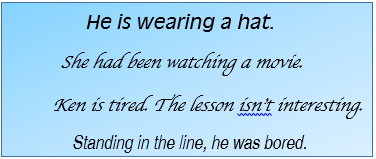The present participle: Formed by adding –ing to the verb. [Note: A gerund is formed by adding –ing to the verb, too. The gerund has the same form as the present participle, but it is only used to act as a noun. Example: I like swimming.]
The past participle: With regular verbs the form is the same as the past tense (-ed). For irregular verbs it must be memorized.
USES:
1. Compound tenses
a. present participle: present continuous with ‘to be’ – He is wearing a shirt.
b. present participle: past continuous with ‘to be’ – He was eating dinner.
c. past participle: present perfect – I have been to America.
d. past participle: past perfect – I had seen the movie before.
e. present & past participles: present/past perfect continuous – She has/had been running for hours.
f. present &/or past participles: future continuous, perfect, perfect continuous – They will be going home / I will have done it soon / She will have been swimming for an hour.
g. past participle: passives – It is owned by me / it was built in 1950 / it will be destroyed next week / my hair has been cut etc.
2. Adjectives
a. The movie was boring / An interesting lecture
b. I was bored / The excited man
Note: Bored/boring pairs – use the past participle (bored) to explain a feeling or effect. Use the present participle (boring) to explain the person or thing that caused that feeling or effect.
I was bored in the lecture. The lecturer was boring. / I am interested in this topic. The topic is interesting.
Tom is bored – this explains how Tom feels (Tom feels bored.) / Tom is boring – this explains the person (Tom) that causes boredom in other people.
3. Adverbs
a. to modify verbs – she sat smiling at him
b. to modify adjectives – it was boiling hot
4. Participle clauses
Participle clauses let us explain things using fewer words. These sentences are more concise. However, they are not very common in spoken English – they are generally used in formal writing and academic papers, where word count is important. Participle clauses require the participle and the verb in the main clause to have the same subject (e.g. [while I was] Waiting for the bus, I did a puzzle). Participle clauses do not indicate the tense on their own – this is done by the main clause (e.g. Waiting for the bus, I always do a puzzle).
a. Present participle clauses
Present participle clauses have a number of uses. Note that present participles have a similar meaning to active verbs.
- To give the result of an action
He was tired, causing the accident. (He was tired,which led tocausing the…) - To give the reason for an action
Not knowing she loved reading, Richard bought her a CD. (Due tonot knowing ….) - To talk about an action that happened at the same time as another action
Standing in the queue, I realised I didn’t have any money. (While I wasstanding…) - To add information about the subject of the main clause
Starting in the New Year, the new policy bans cars in the city centre. (Effectively this is a reduced relative clause: The new policy,which isstarting in the New Year, bans cars in the city centre.)
b. Past participle clauses
Past participle clauses have a number of uses. Note that past participles normally have a passive meaning.
- With a similar meaning to an if condition
Used in this way, participles can make your writing more concise. (If they areused in this way, … ) - To give the reason for an action
Worried by the news, she called the hospital. (Because she wasworried ….) - To add information about the subject of the main clause
Filled with pride, he waited for the bride. (Effectively a reduced relative clause: He,who wasfilled with pride, waited for the bride.)
c. Perfect participle clauses
Perfect participle clauses show that the action they describe was finished before the action in the main clause. Perfect participles can be structured to make an active or passive meaning. They are almost never used in conversational English.
Having got dressed, he left the house.
Having finished their meal, they will wash the dishes.
Having been fired, she searched for a new job.
Having not known his uncle, he was not sad at his parting.
d. Participle clauses after conjunctions and prepositions
It is also common for participle clauses, especially with -ing, to follow conjunctions and prepositions such as before, after, instead of, on, since, when, while and in spite of.
Before sleeping, you should brush your teeth.
Instead of not complaining, you ought to go to reception and give them an earful!
On arriving at the hotel, he checked in.
While making lunch, she noticed she had forgotten to buy a drink.
In spite of having millions of dollars, he lived in a small house.
e. Participle clauses with a different subject
These are not common, but may occur with verbs of sense, such as feel, find, hear, listen to, notice, smell and so on.
Can you hear anyone coming down the hall?
I felt something brushing by my cheek.
She listened to a man screaming about his problems.
I noticed a woman stealing food from the supermarket.
ラボール英会話教室.png)
